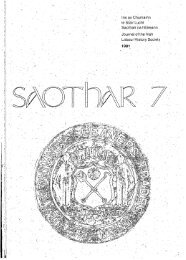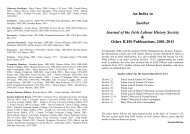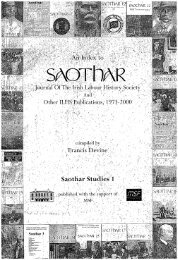64SAOTHAR13perhaps Marx and Engels over-generalised from theLancashire case. More crucially, is it reasonable tocharacterise this as 'the secret' of English workingclass 'impotence '? Marx and Engels knew all too wellthat any adequate explanation of British working classreformism was complex and was not cashable into asimple proposition.. Their diagnosis incorporated a nineteenth centuryvariant on the domino thesis. A successful attack onlandlordism in Ireland would generate a weakening ofaristocratic rule in Britain - how simple it all seemed.'Ireland lost, the British Empire is gone and the classwar in England till now somnolent and chronic willassume acute forms'.2The fear about loss of Empire might have helped tofuel British opposition to Home Rule in the 1880s, butthere is a massive difference between Establishmentparanoia and Marxist wishful thinking on the one hand- and on the other, a thorough interrogation of expectationsby inconvenient facts. The dominoes never fellaccording to plan.Marx was clearly right to emphasise the centralityof the Anglo-Irish relationship for an understanding ofnineteenth century politics. His proposition 'Any nationthat oppresses another forges its own chain '. retainsits resonance, but this should not inhibit the asking ofsignificant questions. If the claim is to be more than amoral judgment about the character of genuine freedom,then it raises the problem of the connectionbetween internal and external oppressions. Marx cer- •tainly posed the question, but surely his substantiveanswer has serious weaknesses. Indeed Marx's writingson Ireland retain a concept of the 'nation' which isnot integrated into his overall theory.' He suggests theinseparability of the land question from the nationalone without clarifying the latter's theoretical status;and in correspondence he is prepared to toss in anational stereotype as an explanatory aid. 'The passionatecharacter of the Irish and the fact that they are morerevolutionary than the English'.3 Overall the problemwith Munck's treatment of Marx and Engels is that anawareness of the significance of their questions shouldnot deflect us from a thoroughly critical assessment oftheir answers.The treatment of Connolly raises similar problems:The initial survey is brief and the lack of reference tocontext makes it easy to claim that his attitude towardsIrish Nationalism was consistent. One strand in Munck'sassessment of Connolly's politics is stereotyped. Inwhat sense could the Irish Citizen Army as involved inthe 1916 Rising be seen as 'the advance guard of theIrish Labour movement'? Here indeed is an ideologicalsymbol masquerading as historical fact. Similarly itseems inadequate to argue that Connolly's writings onnationalism were consistently Leninist. Surely thosepieces articulating the morality of Catholic Ireland orpraising the superiority of German civilisation wouldhave posed a few problems for Vladimir Ilyich? Connolly,a principled Socialist facing agonising choicescannot be given a ready label and so consigned to hisdoctrinal niche.The analysis of recent debates over Marxism andIrish Nationalism is controversial. In response to thosehe characterises as Revisionists,4 Munck suggests thatpartition is a question of democracy and as such ofconcern to Socialists. He contrasts the reality of partitionimposed by military force with the hypotheticalpossibility of consent by a majority of the Irish people.Yet a few lines further on we are told that 'the wholemethod of a numerical head count is 'un Marxist' - themain question should be whether a nationalist war ishindering or promoting the prospects of s~cialism'.(pp. 64-65) .This conflates two claims into one. Certainly thereis a strand in the Marxist tradition which insists thatradical changes will not be produced as a consequenceof formal majority decisions, but as a result of directaction. Yet there remains in principle the insistencethat such a strategy be based on widespread support.The claim is that formal headcounts tend to be overwhelmedby other methods at moments of decisivechange; whether they deserve excommunication to theranks of the 'un Marxist' is another matter. This is aseparate issue from Munck's 'main question'. It issurprising to fmd a consequentialist morality trottedoutas if the history ofthis bleak century had never been.A bald justification of actions in terms of consequencesraises the obvious question of limits on means. Ofcourse consequences are significant in any socialistproject but a failure to discuss the complex relationshipof means and ends is a deficiency that socialist argumentcan do without.Munck's subsequent statement - 'Most independentobservers seem to agree that the war is destabilisingthe bourgeois political structure of north and south.Irish unity would be achieved in this process as part ofa much wider social revolution which would overthrowthe structures of dependent capitalism'. (p. 65) - makesa massive claim.If socialist experience teaches anything it is thatradical projects often have unexpected, sometimes grim,consequences. This should not be a veto on radicalismbut simply a plea for an awareness of complexities.This is absent from Munck' s image of stages - 'Until thenational question is settled, there can be no 'pure' classpolitics in Ireland'. (p. 65)But what would count as a settlement of the nationalquestion? What is a pure class' politics? Whatabout the' Unionist working class so absent from theanalysis? The Revisionists are reproached for theirformalism, but what else is this?These criticisms must be placed in context. TheIrish material is only one element in a wide ranging andknowledgeable text. Given the difficulties of the dia-
REVIEWSlogue, it is hardly surprising that Munck's treatment ofany particular theme will generate controversy. He isright to insist on the centrality of this dialogue tosocialist politics; a formal internationalism has toooften been an evasion. Yet the terms of the complexdebate can constitute their own kind of evasion. Claimsmust be fitted continually against a complex world.Here is another difficult dialogue.NotesDavld HoweIl1. Marx to Mayer and Vogt, 9 April, 1870 in SelectCorrespondence edited by DonaTorr, (London, 1941),p.290.2. Cited by Munck p. 18, sources to Marx and EngelsIreland and the Irish Question, (Moscow, 1971), p.290.3. Marx to Mayer and Vogt, 9 April, 1870, loc .cit., pp.288-289.4. The label is applied to Paul Bew, Peter Gibbon,Henry Patterson and Austen Morgan.BarryColdrey, Faith and Fatherland: The ChristianBrothers and the DevelopmentofIrish Nationalism,1838-1921, (Gill and MacMilIan, Dublin, 1988), pp.338, £27.50Coldrey is in a unique position to write 50th objectivelyand with an insider's perspective on the ChristianBrothers. An historian from Australia, he is himself aChristian Brother and this book is based on a PhD forthe University of Melbourne. It is divided into fivemain sections: Christian Brothers' education and thepatriotic challenge; the education of the rural elite; theideology of resistance; the language revival and nationalism;and the Brothers and political questions.This is not a history of the Brothers nor does itpretend to be. The author confines his argument strictlywithin the limits suggested by the sub-title. WhatEdmund Rice set out to do was to educate, in a distinctivelyCatholic fashion, young boys who had no prospectof receiving education from any other source.Later in the nineteenth century the Brothers were tooffer secondary education to a slightly higher socialclass. In both of these activities the Brothers werepromoting, probably unconsciously, a social revolution.While the content of their education, particularlythe teaching of Irish history, could be seen in retrospectto have had political implications, what was moredecisive in the medium term was that an entire segmentof society was receiving an education previously restrictedto their 'social superiors'. As Coldrey suc-cinctly puts it: 'In a colonial situation education isinherently revolutionary'. (p.5), The Brothers not only taught boys from poorer. backgrounds: the content of their education was differentfrom that of other schools, including those of otherCatholic teaching orders. The Brothers were concernedabove all with the socio-economic advancementof their pupils; hence their concentration on the morepractical subjects such as book-keeping and mechanics.Later developments in nineteenth century educationlaid a far greater emphasis on examination performanceand in time the Brothers' Schools, particularlythe more famous ones such as the North Monasteryin Cork and O'Connell's in Dublin were to dominatethe awards arising out of the 'payments by results'system in spite of the strong oppositon of the Catholiccolleges and their Protestant counterparts.The author examines in some detail the influence ofthe Brothers on the generation that eventually achievedIrish independence. His researches have revealed that125 past-pupils of O'Connell's were involved in the1916 Rising while only five past-pupils of the JesuitBelvedere College, a few hundred yards from O'Connell's,were traced. Seven of the fifteen men (notfourteen as Coldrey states) executed in Dublin after theRising had attended Brothers' schools.Coldrey does not fail to distinguish differenceswithin the Brothers, above all in the attitudes of theolder and younger members towards the 'NationalQuestion'. There were frequent differences of opinionbetween conserv ativ e superiors-general such as RichardMaxwell and young novices, just as there were in thepriesthood and indeed the hierarchy, althoughColdreydoes not develop this.It would be easy to criticise this book for failing togive any account of the relationship between lay teachersand the Brothers who were their employers, or therelationship between the Brothers and the hierarchy,but such topics are outside the scope of this study. Therole of the Brothers in cultivating a strong sense ofpatriotism through a romantic and simple version ofIrish history, of Gaelic sports, of songs and ballads, andin the revival of the Irish language are all dealt withconvincingly through deep and thorough research.The structure of the book is thematic rather thanchronological and this sometimes makes forrepetition.This, however, is a minor criticism. Coldrey hasdocumented admirably the role of the Brothers in thegrowth of a conscious and articulate Irish nationalismin the nineteenth and early twentieth centuries. Someof the evidence he cites is necessarily impressionisticbut compares more than favourably with present-dayassessments on the role of the Christian Brothers inindependent Ireland, which has not been subject tosimilar treatment.Coldrey might have incorporated the growth of the65
- Page 1 and 2:
JOURNAL OF THE IRISH LABOUR HISTORY
- Page 3 and 4:
ContentsPageEditorial: Labour Histo
- Page 5 and 6:
EDITORIAL 3freedom to participate i
- Page 7 and 8:
CorrespondenceThe Irish Labour Part
- Page 9 and 10:
; ~ ; ,The Decline and Fall of Donn
- Page 11 and 12:
THE DECLINE AND FALL OF DONNYBROOK
- Page 13 and 14:
THE DECLINE AND FALL OF DONNYBROOK
- Page 15 and 16: ·' THE DECLINE AND FALL OF DONNYBR
- Page 17 and 18: THE DECLINE AND FALL OF DONNYBROOK
- Page 19 and 20: THE DECLINE AND FALL OF DONNYBROOK
- Page 21 and 22: THE DECLINE AND FALL OF DONNYBROOK
- Page 23 and 24: THE DECLINE AND FALL OF DONNYBROOK
- Page 25 and 26: ,'-,;-''''.A PASSAGE TO BRITAIN 23C
- Page 27 and 28: A PASSAGE TO BRITAIN 25only in the
- Page 29 and 30: A PASSAGE TO BRITAIN 27clothing._De
- Page 31 and 32: A PASSAGE TO BRITAIN 29established
- Page 33 and 34: ;:-.",.- .. .", ...... '.:. '
- Page 35 and 36: LOUIE BENNETI 33feminist movement w
- Page 37 and 38: :... ~: ."
- Page 39 and 40: -.- '.LOUlE BENNETT 37While there i
- Page 41 and 42: LOUIE ~ENNEIT 39Xl's encyclical Qua
- Page 43 and 44: LOUIE BENNEIT 41Bennett's own relat
- Page 45 and 46: LODIE BENNETT 43109; IWWU resolutio
- Page 47 and 48: Essays in ReviewCosherers, Wanderer
- Page 49 and 50: ••• .".'. >. '~"ESSA YS IN RE
- Page 51 and 52: ESSAYS IN REVIEW 49ConnolIy:Myth an
- Page 53 and 54: ESSAYS IN ~EVIEW 51tion' in the Int
- Page 55 and 56: ESSAYS IN REVIEW53International:'I
- Page 57 and 58: REVIEWScontroversy is real history.
- Page 59 and 60: REVIEWSJoe Monks was among the earl
- Page 61 and 62: REVIEWSnolly-Column Song','Proudly
- Page 63 and 64: REVIEWSresulting from the arrival o
- Page 65: REVIEWS,63the book by means of an a
- Page 69 and 70: The Team For All Workers ...CULIAIB
- Page 71 and 72: ESSAYS 69mission and moral refonn.l
- Page 73 and 74: .. ...... ~.~ -~ .'- '.ESSAYS. 71fr
- Page 75 and 76: ESSAYS 73claimed authority but whic
- Page 77 and 78: ESSAYS 75provided the basis for soc
- Page 79 and 80: ESSAYS 779. For comparisons see E.T
- Page 81 and 82: ESSAYS 7952. Annals of Christ Churc
- Page 83 and 84: ESSAYS' 81Fianna Fail and the Worki
- Page 85 and 86: ESSAYS 83Eireann in 1925 visibly di
- Page 87 and 88: ESSAYS 85recognition of the impract
- Page 89 and 90: ESSAYS 871970, it created the condi
- Page 91 and 92: ESSAYS89The Irish Immigrants' Contr
- Page 93 and 94: ESSAYS" 91Although anti -Catholic p
- Page 95 and 96: ESSAYS 93McCowie played a key role
- Page 97 and 98: :. -,,'.' ',. .~.,:.ESSAYS 95Althou
- Page 99 and 100: ESSAYS 97young girl of their own ba
- Page 101 and 102: SourcesIrish Labour History Society
- Page 103 and 104: SOURCES 101INovember, 1971 to no. 1
- Page 105 and 106: SOURCES 103would claim credit for t
- Page 107 and 108: SOURCES105Sources for Irish Labour
- Page 109 and 110: SOURCES 107NorthWest Archives and L
- Page 111 and 112: SOURCES 109In 1966 the Finnish gove
- Page 113 and 114: TURNINGANEWLEAFThe CPSSUis the larg
- Page 115 and 116: REMINISCENCE 113us due to my politi
- Page 117 and 118:
REMINISCENCE 115when Jim was presen
- Page 119 and 120:
REMINISCENCE 117of Dail Eireann. 17
- Page 121 and 122:
REMINISCENCE 119NotesThe above arti
- Page 123 and 124:
DOCUMENT STUDY 121James Connolly in
- Page 125 and 126:
DOCUMENT STUDY123SOCIAL DEMOCRATIC
- Page 127 and 128:
DOCUMENT STUDY 125proletariat of th
- Page 129 and 130:
DOCUMENT STUDY 127the support of Je
- Page 131 and 132:
DOCUMENT STUDY 12926. The Workers'
- Page 133 and 134:
131BibliographyA Bibliography of Ir
- Page 135 and 136:
BIBLIOGRAPHY 133Compton, P.A. Demog
- Page 137 and 138:
BIBLIOGRAPHY 135Levine, I. and Madd
- Page 139 and 140:
BIBLIOGRAPHY 137Turner, M. 'Towards
- Page 141 and 142:
BIBLIOGRAPHY 1394. Land and Agricul
- Page 143 and 144:
BIBLIOGRAPHY 141Clogher Record12 (2
- Page 145 and 146:
BIBLIOGRAPHY 143Political Research
- Page 147 and 148:
BIBLIOGRAPHY 145Pres, 1987.O'Brien,
- Page 149 and 150:
147Notes on Contributorsf onathanBe
- Page 151 and 152:
1901: Ireland's first general union
- Page 153 and 154:
ELECTRICAL TRADES UNION .Establishe





